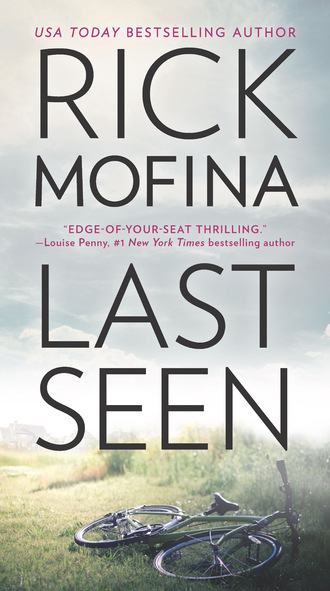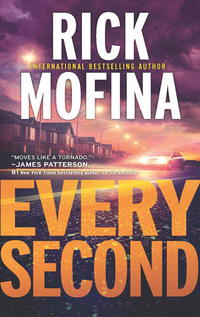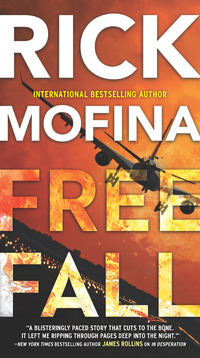
Полная версия
Last Seen
Nearby, Ripkowski, whose bodybuilder arms strained his uniform, was taking careful notes as Faith recounted to him what had taken place. At the same time the officers had requested that Vaughn King, who was watching from the distance, keep the Chambers of Dread closed and keep all staff on hand.
“We mean everybody.” Ripkowski pointed his pen. “Nobody leaves.”
After obtaining the Hudsons’ initial statements, details on Gage’s height, weight, hair and eye color, Berg and Ripkowski moved fast, making a number of transmissions on their shoulder microphones and calls on their phones, to their sergeant, and to the River Ridge Fairgrounds security and operations people.
“Do you have a recent photo of your son?” Ripkowski asked. “We need to get it circulated as soon as possible.”
Faith rummaged through her bag, seizing her phone. “Last Saturday—no, sorry, it was Sunday—Gage went to his friend Ethan Clark’s birthday party. I’ve got a picture.” She swiped through images, stopping at Gage smiling for the camera while behind him some joker, likely Marshall, was holding up two fingers bunny-ear-style above his head. “See, he’s wearing the same blue Cubs shirt. It’s got the mustard stain from his hot dog at the party. I told him to put it in the wash.” Faith was almost embarrassed. “I wanted to get the stain out but it’s his favorite shirt.”
“Okay, send it to me now.” Ripkowski held up his phone displaying his email. His phone chimed receipt of the picture after Faith, fingers shaking, typed it into her email app and sent the photo. Ripkowski then forwarded it to a number of addresses and made a call, speaking urgently to a fairgrounds person while nodding to the billboard-size TV screen suspended high above their section of the midway.
The sign was flashing with ads, selfies and images of people having fun at the fair, much like the giant screens at Times Square. There were four screens overlooking the grounds, one at pretty much every compass point.
“Here we go,” Ripkowski said.
Faith gasped when the screen suddenly went blank, then popped to life with Gage smiling down at her, the words Lost/Missing shouted above his head. Gage’s name and description appeared next to his face, in missing-person poster-style with a message urging anyone who’d seen him to call 911.
“That’s up now and will stay up on all the screens,” Ripkowski said. “I’ll send copies to you and your husband to spread the word, too.”
* * *
In the minutes that followed, Cal and Faith called the parents of Gage’s friends hoping that by some wild coincidence they were in fact also here, and maybe Gage had seen them and joined them.
“Hey, Pam, it’s Faith. This is going to sound weird, but are you guys at the fair today?”
“No, I’m home doing a wash. Dean’s with Colton at Walmart looking at fishing rods, or reels, or some man-thing. Why, what’s up?”
Faith stifled her tears, cupping her hand to her face as she spun around in the chaos, seeing Cal on his phone, hearing him speaking to their friends the Thompsons.
“Jack, any chance you, Michelle and Marshall are down here at the fair right now?” he was saying.
Those calls and the others they’d made didn’t yield Gage, but their friends, shocked by the gravity of Gage’s disappearance, began mobilizing to come to the fairgrounds to help. Cal and Faith, both ashen-faced, watched from a few yards away as the search for Gage continued widening with great speed. There was one thing that could help.
Cal called Stu Kroll, his editor at the Star-News.
“It’s Cal again—listen—”
“Hey, it’s okay, we caught it. Changed it to fifty. It’s all good.”
“No, Stu, listen. Our son’s missing down here at the River Ridge fair.”
“What do you mean?”
“I’m going to send you his picture and information from the police—”
“The police?”
“Yeah, it’s looking serious. We need to get the word out now. Would you guys put it up on the site and tweet it out?”
“I—I’m not sure. I mean, you’re an employee—”
“Please, Stu! Please! I’m sending it now. I gotta go.”
Ripkowski and Berg had arranged for a River Ridge patrol car to park at the Hudsons’ house just in case Gage somehow made his way home. Cal and Faith contacted their nearest neighbors—Ethan’s parents, Sam and Rory Clark—who upon hearing the news immediately agreed to join the police at their house to watch for Gage.
Meanwhile, the fairgrounds chief, Herb Dulka, had trotted to the chutes, phone pressed to his ear, joining Ripkowski and Berg, who’d waved in Vaughn King, while more police officers and other security people arrived.
“We’ve circulated Gage’s picture force-wide,” Ripkowski said. “It’ll be up on social media any minute now, notifying everyone across Chicago, the state, the entire country. And I’ll talk to my supervisor to ensure we cover all our bases and look into possibly issuing an Amber Alert.”
Dulka said, “We’ve given the photo to all our people on the grounds at the gates and in the parking lots and we’re starting the shutdown process for the announcement.”
“Good.” Berg turned to King. “Our people and firefighters are going to search the attraction and we’re going to take statements from all of your people working it.”
“Not a problem.” Vaughn nodded.
“But first—” Ripkowski nodded to the Chambers “—what about your cameras in there? You got surveillance footage? It might show us something.”
“Yes, we have cameras and we’re working on getting the footage but there’s a problem.”
“What’s the problem?”
“The playback’s frozen. The Chambers took a lightning strike last week when we were in Milwaukee and the system’s been skittish ever since.”
“We need that footage,” Ripkowski said.
“We’re working on it.”
Near them the Polar Express emitted a hydraulic sigh as it slowed. Then the Zipper groaned to a halt as ride cycles ended and riders disembarked. People were kept off and the rides across the midway remained idle while everywhere the blaring rock music at each ride ceased.
“Almost ready.” Dulka was on his phone, then nodded. “Okay, go!”
A public address system awoke, screeching feedback, then a woman’s voice crackled through it with a message that came through loud and clear.
“Attention everyone. We have an emergency. We’re looking for a little boy, Gage Hudson. He’s nine and he got separated from his folks near the Chambers of Dread a little while ago. Gage’s picture is up on the big screens. Please take a look now, then look around you. Gage, if you’re seeing this, go to any ticket booth, police officer or security person, and they’ll find your folks for you. Everyone, please look around your area for Gage and let’s get him back to his folks. Please, do it now—it’ll only take a moment. Thank you.”
The chaos had been subdued and a somber air fell across the thousands of people at the River Ridge Fairgrounds. It was soon interrupted by the distant calling of people shouting, “Gage!” from various corners, as if engaged in a Marco Polo game. But it wasn’t long before the murmuring gave way to demands for the party to resume as some calls devolved into “Gage, you’re in deep shit!” and “Your mama’s gonna whip your ass, Gage!”
During the fifteen minutes the midway was halted, no walkie-talkies crackled and no phones rang to end Cal and Faith’s agony. No one had spotted Gage. With each terrible, surreal second that passed, Cal and Faith felt their horrible fear increasing and their panic rising.
It was all they could do to keep from falling off the earth.
6
Gage comes out of the portal with Faith and Cal, they pass the cloaked figure, move to the dungeons where hands claw at them; Gage’s eyes glow; the infrared images of the Hudsons are captured in shades of gray, black and radiant white; the Hudsons move through darkness; ahead and behind them other groups creep with trepidation: a man and woman holding hands, two teenage girls holding each other, their eyes and teeth blazing, moving beyond the phosphorescent flames of the burning witch, then the insane butcher, the fanged clown; some people are cowering, others are crouching in the cave of bats and spiders; Gage, Faith and Cal rush across the zombie graveyard pursued by the chain-saw maniac to the coffin doorway when they vanish in the sudden flash of a static snowstorm.
“Play it again,” Ripkowski said.
He was with Berg and Vaughn King in the cramped, dimly lit control room attached to the Chambers of Dread. They watched over Alma McCain’s shoulder as she operated the attraction’s console bank of infrared security cameras. A can of diet cola, a half-eaten slice of pizza and a Lord of the Flies paperback were next to her. Small TV screens displayed images for each section of the Chambers, but the system had malfunctioned for the final sets. Alma pecked at her keyboard, replayed the footage, but it was futile at the spinner.
“This is where it freezes and won’t work. It’s given us trouble since the lightning strike in Milwaukee.”
“Did you see anything unusual when you watched this live when the Hudsons went through?” Ripkowski asked Alma.
“No, but to be honest, I wasn’t looking at the spinner at that time.”
“Were you reading?”
“No, I was not reading. I take my book with me on breaks.”
“Did an emergency door alarm activate anywhere today?”
Alma exchanged a quick glance with King before saying, “No.”
“So—” Berg tapped her pen on the screen “—we’ve got four emergency exits and six exit chutes with no recorded video. Erik, what do you think?”
“We need IT’s help to recover that footage if they can—either our people, or Chicago PD, somebody with the expertise—because this is where the boy vanishes. And we’re going to need statements ASAP from everyone on duty today.”
Then Berg and Ripkowski stepped outside to update Cal and Faith amid the noise of the midway, which, with the exception of the Chambers of Dread, had resumed action at full throttle.
“Did the cameras show you what happened?” Cal asked.
“No, they’ve got technical trouble with their system,” Berg said. “But we’re going to have experts look at it.”
“Dammit.” Cal’s eyes were brimming, for it was now close to ninety minutes since Gage had vanished. “What about the RVs and trailers behind the rides where all the midway people live? Did you check there?”
“We’re on it.” Berg moved the Hudsons slightly so they could see between the rides; uniformed officers were knocking on trailer doors. “Our people, and Cook County officers, are canvassing in there right now,” Berg said. “Few people are home, most are working the midway. The chances someone was around to see anything are slim.”
“There must be something more you can do!” Faith’s voice broke, then she turned to King and Dulka, letting loose with her frustration. “Why did you start the fair again? Please shut it down so we can keep looking! Our son is missing!”
“Ma’am,” Dulka said, “we’re taking this very seriously. We’re going to keep your son’s picture up on the big screens all day. We’ve closed the Chambers. We have our staff on the grounds searching for him. We’re doing everything we can, but we’ve got thousands of paying customers.”
Faith’s head snapped to the officers.
“You’re the police! Can’t you order them to shut it all down?”
“Not at this time, as no crime’s been committed,” Ripkowski said. “Everyone’s coopera—”
“But there has to be more you can do to find Gage!” Faith shouted. “What about bringing in detectives and the FBI?”
“We’re bringing in canine units and we’re—” Ripkowski and Berg’s radios crackled. “Erik, Angie! We’ve got him at the south gate!”
* * *
Cal and Faith ran to the gate with Ripkowski and Berg. Faith’s heart was racing and she fought back tears as their small posse wove through streams of fairgoers.
Cal’s jaw was fixed in restrained relief when they came to a wooden outbuilding standing to one side of the gate where two security staff waited; both of them were in their teens.
“Where’s our son?” Faith asked.
“Inside that door, with the cops.” One of the security kids pointed. “He was so smart, ma’am—kept yelling that the man with him was not his father. That got our attention.”
When Ripkowski opened the door, Faith and Cal felt their hearts plunge. The boy in the chair, under the watch of two officers, was wearing a blue Cubs shirt but dark-colored shorts and—
“He’s not our son,” Cal said.
Faith steadied herself against the doorframe as a man behind them said, “This is huge mistake!” Two other officers had placed plastic handcuffs on his wrists. “Trevor, for God’s sake, tell them the truth!”
The boy, who appeared to Cal and Faith to be eleven or twelve, screwed his face into an icy grimace, then spat, “You’re not my father!”
At that moment a distraught, breathless woman arrived with a girl of about seven, who was clutching a big blue stuffed bear, as if to shield her from what was unfolding. The woman asked, “Don, Trevor, what’s going on?”
Ripkowski approached the woman. “Can you show me some identification? Do you know these people, ma’am?”
“I’m Marjorie Bricker.” She fished her wallet from her purse. “He’s my son, Trevor, and he’s Don Zaret, my fiancé. What is this—why’re you arresting him?”
“Marj,” Zaret started, “Trevor was trying to pass himself off as the missing kid—”
“We told you to keep quiet!” one officer said.
Zaret continued, speaking faster. “He made it look like I’d kidnapped him. I told these officers that it was because I wouldn’t let him ride the Rocket Blaster by himself.”
“I’m warning you, sir!” the officer said as Zaret got one more plea in.
“Remember, those were your instructions, Marjorie. No Rocket Blaster or Avalanche!”
The woman was showing Ripkowski photos on her phone of the family together. “See, he’s my son!”
Ripkowski turned to Trevor. “Is this all true?’
Trevor looked at his mother, then at the Hudsons. He was perceptive; he’d figured out who Cal and Faith were and knew the seriousness of what had befallen them. He’d seen the sober reality up on the big screens. Now, reading the pain in Cal’s and Faith’s faces, he turned to Marjorie Bricker and his chin crumpled.
“Why do you have to marry him, Mom? Did you stop loving Dad?”
“Oh, sweetheart, of course not. I’ll always love your father.” Marjorie hugged the boy, turning to the Hudsons and police, stifling her tears. “My husband—Trevor’s dad—was a soldier. He was killed in Afghanistan just over two years ago. Trevor’s had a hard time accepting Don in our lives.”
Zaret, still cuffed, blinked at the ceiling.
“Please.” Bricker turned to the police. “This is all a misunderstanding.”
The arresting officers were processing the explanations.
“Look,” one of them said. “It’s going to take some time for us to sort things out. We’re going to need to verify everyone’s ID.”
Marjorie Bricker turned to the Hudsons. “I’m so sorry. Please understand.”
Cal and Faith nodded but they didn’t understand.
How could they?
At this point nothing made sense to them.
Absorbing their heartbreak, they made their way back to the Chambers to face the mounting horror of Gage’s disappearance.
7
Yellow plastic police tape had gone up around the Chambers of Dread.
America’s flag of tragedy, Cal thought, his mind pulling him back to crimes he’d known as a reporter. Like when he’d watched a grieving husband look through closets and drawers for a photo of his wife, killed in a hit-and-run—“I’m sorry, she was shy about having her picture taken.”
Or the time an inconsolable mother had shown him her murdered son’s bedroom, his towel still damp from his shower that morning. He’d been shot in gang-war cross fire the day he’d received his acceptance letter from Loyola.
Cal never forgot interviewing a chain-smoking priest who’d given last rites to a great-grandmother stabbed and robbed on the street after buying groceries, his hand shaking with each pull.
In writing their stories, and so many others like them, Cal had accepted what he was: an invader.
Intruding on people’s torment at the most horrible time of their lives was what he did for a living. Sure, he could always justify and rationalize it as his job—the champion of a free press. But he hid the creeping fear that one day there’d be a reckoning, a price to be paid for these and his other sins—including the one that haunted him to the point where he questioned his worth as a reporter. As a person.
But over time, as his professional armor had hardened, he’d grown smug, thinking he was immune to being touched by crime. It couldn’t happen to him. It just couldn’t. He was a middle-class family man, a decent guy, living in a good West Side neighborhood.
But here he was, grappling with a terrifying reality.
His son was missing.
A fact so chilling it numbed him.
It was now more than two hours since Cal and Faith had seen Gage.
Cal was waiting at the Chambers while Faith took a turn searching the immediate midway again. Gage had to be out there somewhere. If he’d run off to play some kind of game intent on popping up and saying, “Guess I really scared you guys!” Cal swore he would kill him. But Gage wouldn’t ever play a joke like that. He’s a good kid.
Checking his phone Cal saw that the Chicago Star-News had posted Gage’s picture and details about him online. He called the newsroom.
“Stu, it’s Cal. Anyone contact the paper with anything on Gage?”
“Sorry, Cal, nothing yet but nutbars. Wish I had better news.”
Cal dragged both hands over his stubbled face as he hung up. He was a smart reporter, skilled at his craft; there had to be something more he could do. He racked his brain, then texted Stu with an idea. The moment after he sent it, his phone rang. It was Faith.
“On my way back—anything?”
“Nothing.”
The police alert on Gage’s disappearance had triggered several actions. One was the swift response of the River Ridge Neighborhood Patrol. A dozen volunteers, with more on the way, had arrived at the fairgrounds wearing lime green vests. They were equipped with radios, cell phones, maps, experience in searches and a “can-do” attitude.
“We have always found who we’re looking for,” the patrol leader, who was a retired cop, assured the Hudsons. “Little kids, Alzheimer’s patients who’ve wandered off...sooner or later, we find ’em.”
With the blessing of Herb Dulka and Vaughn King, the patrol had set up, near to the Chambers, a temporary Gage Hudson Search Center, consisting of tent canopies and several folding tables, all provided by the fairgrounds and midway. In quickly organized operations, the patrol fanned out to search the fair and neighborhoods surrounding the grounds.
Cal and Faith had taken turns scouring the midway with searchers, going up and down the avenues, looking behind rides, behind games of chance, in restrooms, picnic areas, all while Gage stared down on them from his picture on the giant screens.
Back at the search center Cal and Faith saw firefighters probing the underbelly and the roof of the Chambers. Others had gone inside to examine the interior. So far, they’d found nothing. A dog barked and the Hudsons turned to a police officer and a panting German shepherd.
“Folks, Officer Peddet. This is my partner, Champ. We’re here to help. Do you have anything belonging to Gage that he would have worn?”
Faith reached into her bag. “I’ve got his hoodie. I’d brought it in case it got chilly, or rained.”
“Good, don’t take it out yet.” Peddet, who wore large glasses, making him look like Clark Kent, led Champ and the Hudsons closer to the chutes of the Chambers and the exit stairs near the back. “This is the area where you last saw your son?”
“Actually, inside on the spinner,” Cal said.
“Okay, we’ll go inside. I’ll take the hoodie with me now.”
Faith withdrew the soft blue hoodie. Champ yipped as Peddet let the dog sniff the fabric.
“We’ll try to pick up Gage’s scent,” Peddet said, “but we’ve got a lot of smells in the air. It’ll be challenging and may take some time.”
Cal and Faith watched as Peddet and Champ left to search for a trail, Champ’s leash jingling as he tugged at it.
At that moment, Cal’s phone rang. It was the Star-News.
“Cal, its Bannon. Do you have a second?”
He repositioned his grip on his phone. “Yeah.”
“Stu just assigned me to call you for comment on the story we’re doing, but if there are more ways we can help, you let us know.”
Cal was grateful Stu had taken his suggestion earlier, that the Star-News do a quick story.
“Good, what do you need, Rich?”
“Just tell me what happened—what’s going through your mind?”
Cal hesitated, thinking how Bannon had asked exactly what he would’ve asked a parent if he were doing a story. Cal exhaled, quickly related the history of events, ending with: “We’re deeply concerned but hopeful we’ll locate him.”
“Thanks for talking to me and good luck. I’ll get a story up fast as I can. You should know that Stu’s sent Lori Kowski and Franco to the fair.”
Cal knew that the case of a missing child would draw media attention. And it did. A TV news crew from Channel 9 was the first to arrive, followed by reporters from the Chicago Tribune, the River Ridge Review, Chicago Sun-Times, Channel 77, WBTN Radio News, Channel WT2 and, as expected, Lori Kowski, a reporter, and Franco Ginnetti, a photographer, from his own paper.
Security staff had helped keep Cal and Faith out of view, taking them to a trailer for privacy to prepare to speak to the press.
“This can’t be real,” Faith sobbed.
“Maybe he wandered off,” Cal said.
“Why didn’t you let me hold his hand, Cal?”
“Because he’s doesn’t want to be babied. You’re always smothering him, Faith.”
“How would you know what he wants or doesn’t want? You’re barely ever home!”
Cal shook his head bitterly. “You should’ve been watching him, Faith.”
“Don’t you dare put this on me! You had him.”
“Me? He was with you on the spinner.”
“No, he was with you! I told the police I last saw him with you.”
“That’s what you told them?”
“It’s the truth.”
Cal looked away, took a breath, then looked back.
“We have to stop this. We have to stop fighting because in about one minute we’re going to step in front of the cameras and ask people to help us find our son.”
Faith hugged herself while shaking her head. “I don’t think I can speak to them.”
“We’ve got to provide a united front. We’ve got to keep pushing the word out. Just stand by me. We’ll keep it brief and I’ll do the talking. Can you do that...for Gage?”
She cupped her hands to her face. “I need a moment,” she said.
“For what?”
She reached into her bag. “I have to fix my hair and face.”
* * *
Upward of twenty newspeople were waiting near the Chambers when Cal and Faith came out. They were joined by Dulka, King and Officer Bryan DeSanto, a River Ridge police spokesman who led off the news conference with a short summary and update on the ongoing search before turning to them.
“Gage’s parents have agreed to take a few questions,” DeSanto said, triggering a deluge as cameras flashed on them.
Cal was ruggedly handsome with his soft stubble, dark eyes and dark hair. Faith, even anguished, had the fresh-scrubbed face of a natural beauty, framed by blond shoulder-length locks with a slight wave.
They were the all-American middle-class couple.
“Mr. Hudson, was your son was abducted?”
“There’s no evidence of that.”
“No calls for ransom, no one claiming responsibility?”
“No, nothing to suggest he was abducted.”
“But you go into the ride and leave without him? Isn’t it likely that someone, somehow, kidnapped him?”





